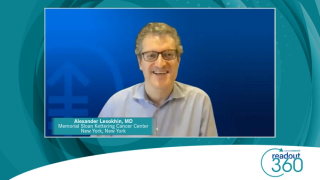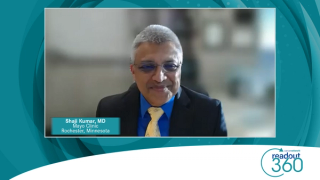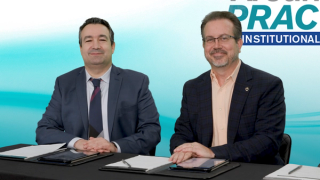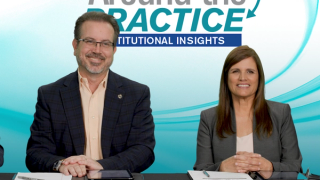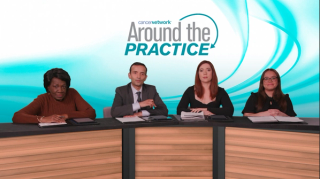
Multiple Myeloma
Latest News
Latest Videos

CME Content
More News

The US Food and Drug Administration (FDA) has approved the use of Doxil (doxorubicin liposome injection, Ortho Biotech) in combination with Velcade for Injection (bortezomib, Millennium) to treat patients with multiple myeloma who have not previously received Velcade and have received at least one prior therapy.

NORWALK, Connecticut—The Multiple Myeloma Research Consortium (MMRC) and Nereus Pharmaceuticals, Inc., San Diego, have initiated enrollment in a multicenter phase I clinical trial to study Nereus' novel, second-generation proteasome inhibitor NPI-0052 in patients with relapsed or relapsed/refractory multiple myeloma. Participants in the open-label study will receive escalating, once-weekly intravenous doses of NPI-0052. The compound was discovered during the fermentation of a new marine actinomycete (Salinispora tropica).

The American Society of Clinical Oncology (ASCO) has developed updated guideline recommendations on the use of bisphosphonates in patients with multiple myeloma. The key recommendations address three areas: therapy duration, dosage, and monitoring; osteonecrosis of the jaw; and several previous recommendations.

Our better understanding of the complex interaction of multiple myeloma (MM) cells with their bone marrow microenvironment and the signaling pathways that are dysregulated in this process has resulted in a dramatic increase in the therapeutic agents available for this disease. A number of these new agents have demonstrated significant activity in patients with MM. Over the past 5 years, three drugs have received approval from the US Food and Drug Administration for therapy in MM—bortezomib, thalidomide, and lenalidomide. To date, the choice of therapy for MM is not individualized according to the biologic characteristics of the disease, but future studies should enable us to identify patients who may benefit most from certain therapeutic interventions, and thus develop individualized therapy for MM. In this review, we will present some of the treatment algorithms currently developed for patients with MM and focus on established advances in therapy, specifically with thalidomide, bortezomib, and lenalidomide. We will also discuss some of the emerging novel therapeutic agents showing promise in phase I/II clinical trials in MM.

Revlimid/Velcade Combo Active, Well Tolerated in Myeloma

Rev/Lower-Dose Dex for Myeloma Induction

Induction therapy with lenalidomide (Revlimid) and low-dose dexamethasone substantially reduces the risk of adverse events, compared with a high-dose steroid regimen, in patients with newly diagnosed multiple myeloma

Repeated treatments with bortezomib (Velcade) for relapsed multiple myeloma are safe and effective, and are not associated with new or cumulative toxicities

The combination of lenalidomide (R) (Revlimid) with oral melphalan and prednisone (MP) induces responses in a high proportion of patients with newly diagnosed multiple myeloma.

The combination of liposomal doxorubicin (Doxil) and bortezomib (Velcade) significantly improved time to progression (TTP) in patients with relapsed or refractory multiple myeloma, compared with bortezomib alone

The thalidomide analogue lenalidomide (Revlimid), which isapproved for use in multiple myelomaand in certain myelodysplastic syndromes,is associated with skin reactions,mainly rashes and pruritus.

World-renowned thought leaders discussed important clinical advances and new guidelines in the diagnosis and treatment of hematologic malignancies, at the first annual National Comprehensive Cancer Network (NCCN) Hematologic Malignancies Congress.

Multiple myeloma is now the most common indication for autologous stem cell transplantation (ASCT) in North America, with over 5,000 transplants performed yearly (Center for International Blood and Marrow Transplant Research [CIBMTR] data). While the role of ASCT as initial therapy in multiple myeloma has been established by randomized studies, newer therapies are challenging the traditional paradigm. The availability of novel induction agents and newer risk stratification tools, and the increasing recognition of durability of remissions are changing the treatment paradigm. However, even with arduous therapy designed to produce more complete remissions—for example, tandem autologous transplants—we have seen no plateau in survival curves. A tandem autologous procedure followed by maintenance therapy may be performed in an attempt to sustain remission. Sequential autologous transplants followed by nonmyeloablative allotransplants are pursued with the hope of "curing" multiple myeloma. We examine how the key challenges of increasing the response rates and maintaining responses are being addressed using more effective induction and/or consolidation treatments and the need for maintenance therapies after ASCT. We argue that given the biologic heterogeneity of multiple myeloma, risk-adapted transplant approaches are warranted. While the role of curative-intent, dose-intense toxic therapy is still controversial, conventional myeloablative allogeneic transplants need to be reexamined as an option in high-risk aggressive myeloma, given improvements in supportive care and transplant-related mortality.

The combination of lenalidomide (Revlimid) with melphalan and prednisone (R-MP) is highly active and well tolerated in older adults with newly diagnosed multiple myeloma.

The addition of bortezomib (Velcade) to tandem transplantation as upfront therapy for multiple myeloma is safe and associated with high rates of complete and near complete response

Patients with newly diagnosed multiple myeloma have better progression-free survival with the combination of thalidomide (Thalomid) and dexamethasone (Thal/Dex) than Dex alone

Patients with relapsed or refractory multiple myeloma have a higher response rate and longer time to progression when lenalidomide (Revlimid) is added to dexamethasone (Len/Dex), regardless of prior thalidomide (Thalomid).

Elderly patients with newly diagnosed multiple myeloma are likely to survive nearly 2 years longer if thalidomide (Thalomid) is added to the standard melphalan/prednisone (MP) regimen, and they may gain about 10 months longer progression-free survival (PFS),

The FDA has approved Celgene's Supplemental New Drug Application for Revlimid (lenalidomide) in combination with dexamethasone (Rev/Dex) for the treatment of multiple myeloma patients who have received at least one prior therapy.

Thalidomide (Thalomid) has "changed the paradigm" for treating multiple myeloma, and advances in understanding the relationship between myeloma cells and the bone marrow microenvironment promise to change it even more, Kenneth C. Anderson, MD, of the Dana-Farber Cancer Institute, said at the National Comprehensive Cancer Network (NCCN) 11th Annual Conference.

During the past 18 months, researchers have developed substantial evidence supporting the notion that stem cells play a critical role in the development of at least some cancers, their progression, and the prognosis of patients, including breast, brain, lung, and prostate cancer, multiple myeloma, and melanoma.

For patients with refractory or relapsed multiple myeloma, a lower dose of thalidomide (100 mg/d) offers similar efficacy to the higher dose (400 mg/d), but with fewer side effects. Ibrahim Yakoub-Agha, MD, of CHRU Lille, France, reported the results of IFM-01-02 at the 47th Annual Meeting of the American Society of Hematology (abstract 364), for the Intergroupe Francophone du Myelome.

The FDA has given priority review status to Celgene Corporation's supplemental new drug application for lenalidomide (Revlimid) in combination with dexamethasone for the treatment of relapsed or refractory multiple myeloma.

Keryx Biopharmaceuticals, Inc. has initiated a clinical program to evaluate KRX-0401 (perifosine) for the treatment of multiple myeloma.

A trial of melphalan (Alkeran)/prednisone plus thalidomide in newly diagnosed elderly patients with multiple myeloma suggests that the oral regimen should be the reference treatment for patients in this population who are ineligible for high-dose therapy, according to Thierry Facon, MD, Inter-Groupe Francophone du Myelome (IFM), Lille, France.

